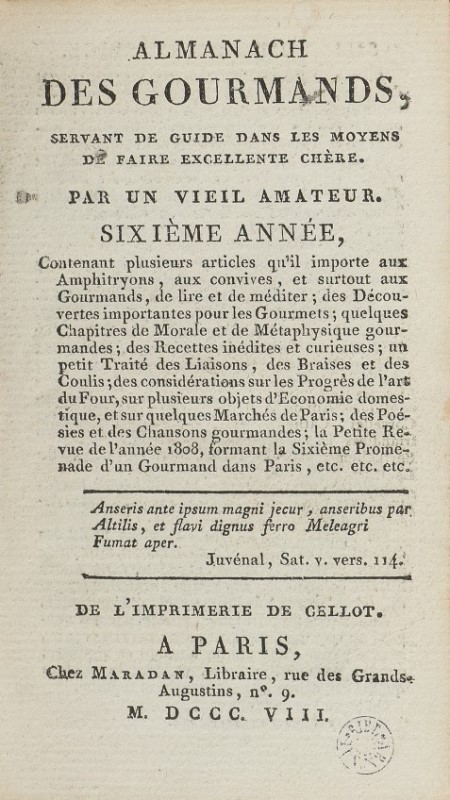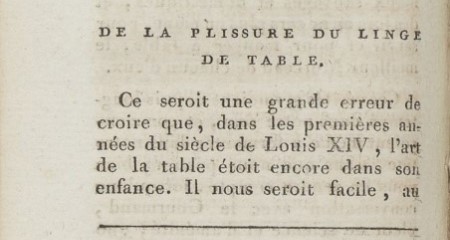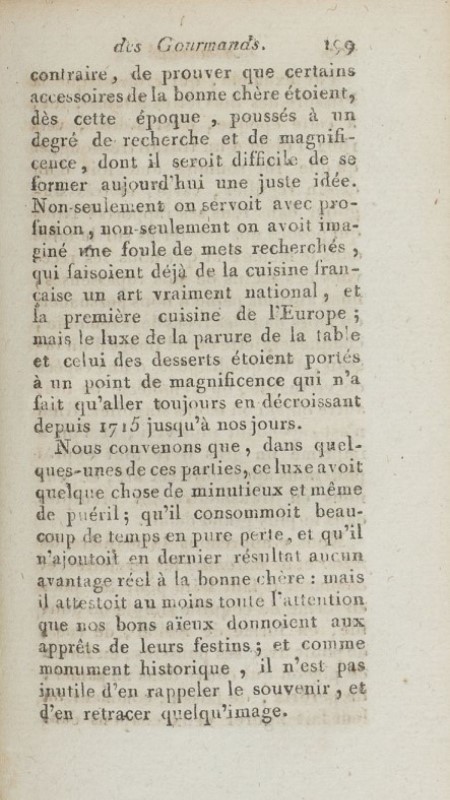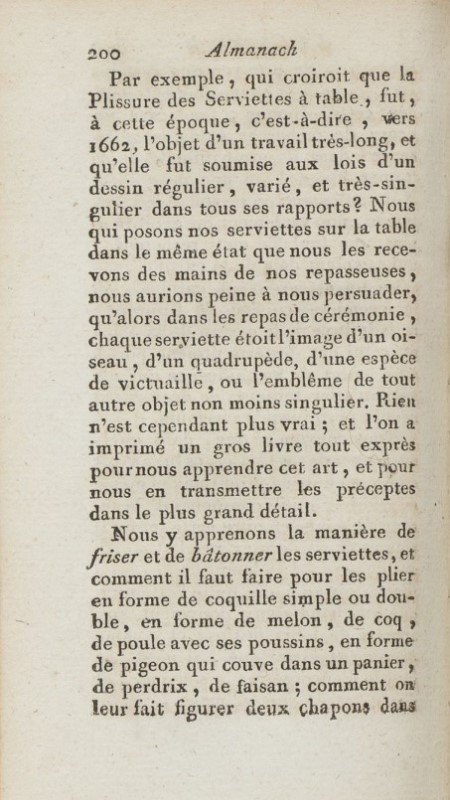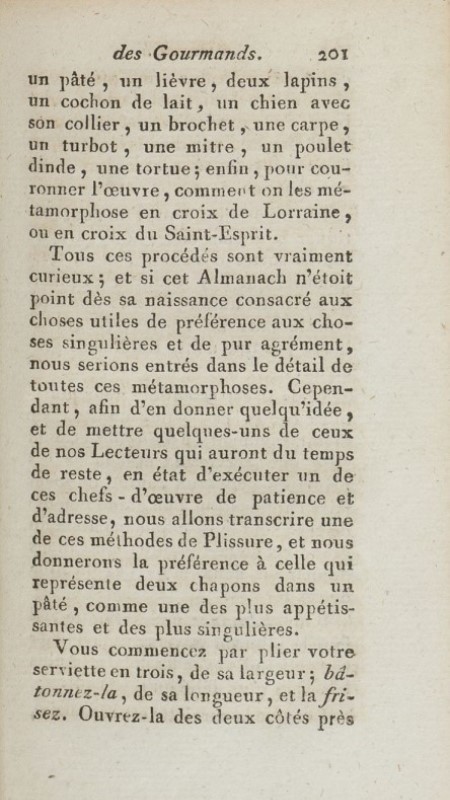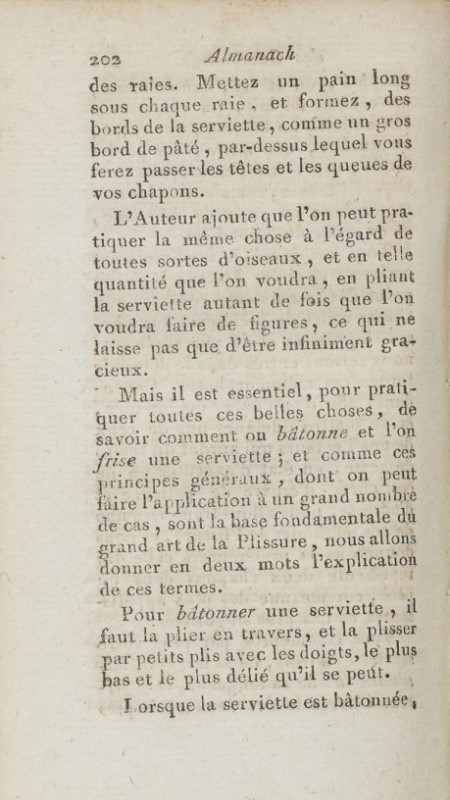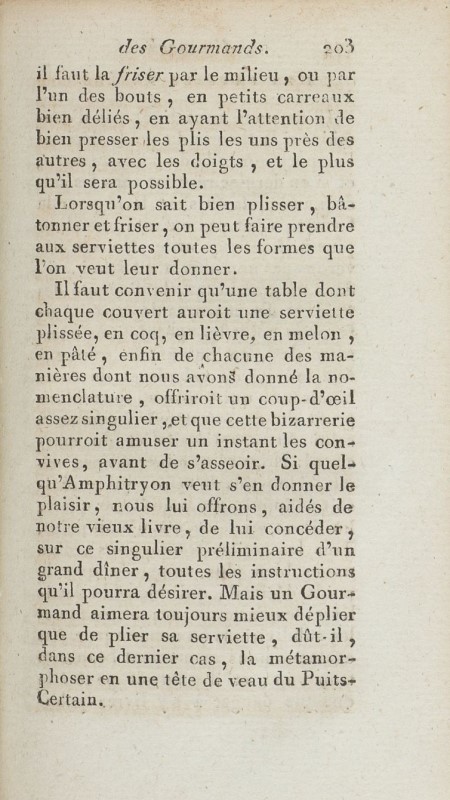| The Public Paperfolding History Project
x |
|||||||
| Almanach des Gourmands, 1808 | |||||||
| 'Almanach
des Gourmands', was an annual almanac published in Paris.
The sixth issue, published in 1808, contains a section on
the folding of serviettes. The reference to a 'verly long
work' of 1662 is to 'L'Escole parfaite des officiers de bouche', upon which the paragraph
starting 'We learn how to curl ...' is also based. Roughly translated this says: 'Folding Table Linen It would be a great mistake to believe that, in the first years of the century of Louis XIV, the art of the table was still in its infancy. It would be easy for us, at contrary, to prove that certain accessories of good food were, from that time, pushed to a degree of research and magnificenee, of which it would be difficult to form today a just idea. Not only did we serve with pro-fusion, not only did we have a host of sought-after dishes, which already make French cuisine a truly national art, and the first cuisine of Europe; but the luxury of the adornment of the table and that of the desserts are brought to a point of magnificence that has only gone ever down from 1715 to the present day. We agree that in which of these parts this luxury has something meticulous and even childish; that it consumed a lot of time in pure waste, and that it did not add in the last result any real advantage to good food: but it attested at least all the attention that our good ancestors gave to the primers of their feasts; and as a historical result, it is not useless to recall the memory and to retrace some image of it. For example, who would believe that the Fold of Napkins at the table, was, at that time, that is to say, around 1662, the object of a very long work, and that it was subject to the laws of a regular, varied, and very singular drawing in all its reports? We who put our napkins on the table in the same state as we receive them from the hands of our ironers, we would have difficulty persuading ourselves, that then in the ceremonial meals, each towel was the image of an bucket, a quadruped, a kind of victual, or the emblem of any other object no less singular. Nothing could be further from the truth, however; and a large book was printed on purpose to teach us this art, and to transmit to us its precepts in the greatest detail. We learn how to curl and stick napkins, and how to fold them in the shape of a simple or double shell, in the shape of melon, rooster,hen with its chicks, in the shape of a pigeon that smoulders in a basket, partridge, pheasant; how they are made to include two capons in a pâté , a hare, two rabbits, a suckling pig, a dog with his collar , a pike, a carp, a turbot , a mitre, a turkey, a turtle; finally, to hide the work, how they are transformed into the cross of Lorraine, or the cross of the Holy Spirit. All these processes are really curious; and if this Almanac were not from its birth devoted to useful things rather than singular and pure pleasure, we would have gone into the details of all these metamorphoses. However,, in order to give some idea, and to put some of those of our Readers who will have time to stay, in a position to execute one of these masterpieces of patience and adrebse, we will transcribe one of these methods of Plissure, and we will give preference to the one that represents two capons in a pie, as one of the most appetizing and singular. (Folding instructions not translated) It must be agreed that a table of which each cutlery would have a pleated napkin into a rooster, hare, melon, pâté, finally of each of the materials of which we have given the nomenclature, would offer a rather singular glance, and that this oddity could amuse the convives for a moment, before sitting down. If amphitryon wants to give himself the pleasure, we offer him, with the help of our old book, to concede to him, on this singular preliminary of a great dinner, all the instructions he may desire. But a Gourmand will always like to unfold better than to fold his napkin, he had to metamorphose it into a calf's head of the Well-Certain.' ********** Selected Pages
********** |
|||||||
